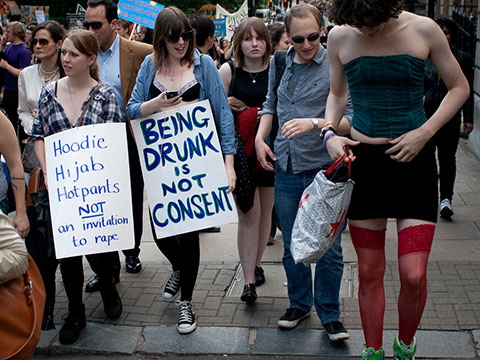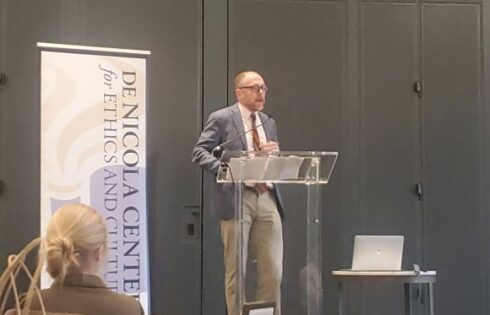
But more specific definition of ‘incapacitation’
Neck rubs can qualify as sexual battery at East Carolina University, and now blaming your girlfriend could be intimate partner violence at the University of Michigan.
The University of Michigan revised its sexual misconduct policy this spring and it will take effect July 1. The stated reason for the update, according to an executive summary dated April 6, is to keep in compliance with “new federal law and guidance,” but the school also mentions an ongoing Title IX investigation by the federal Office for Civil Rights.
It’s not the first time the university has made brow-raising claims about what qualifies as sexual violations: It has previously said that withholding sex and “discounting” a partner’s feelings qualify as “sexual violence.”
While the updated policy might help accused students, by letting them admit more evidence and retain an attorney as an adviser, it also continues to include some ambiguity.
After discussions with students, the university added a section on intimate partner violence, which “includes any behaviors that intimidate, manipulate, humiliate, isolate, frighten, terrorize, coerce, threaten, blame, hurt, injure, or wound someone.”
The terms are neither defined nor used in examples, either to illustrate their breadth or their limits. “Blame” could be understood to mean both objectively accusing a partner of not being faithful by citing hard evidence, or subjectively accusing a partner of not spending enough time together.
RELATED: Federal judge validates due-process lawsuit against Brandeis by student accused of rape
In contrast, the university made changes to distinguish two oft-confused concepts: intoxication and incapacitation.
“Many community members, especially students, noted that the Sexual Misconduct Policy did not provide enough information regarding incapacitation, especially as it relates to intoxication from alcohol or other drug use,” the school wrote in its executive summary.
The university says that the mere fact students have been drinking does not mean they were incapacitated and could not freely consent. “A person is not necessarily Incapacitated merely as a result of drinking or using drugs; the level of impairment must be significant enough to render the person unable to give consent.”
While limiting the admissibility of past sexual history, the university does allow it to be used during the investigation.
Prior history may be used for “determining pattern, knowledge, intent, or the Respondent’s reasons for taking the action,” the new policy says. The university will evaluate the “relevance of pattern evidence … based on an assessment of whether the previous or subsequent conduct was substantially similar to the conduct under investigation or indicates a pattern of similar Prohibited Conduct.”
Routine intimate actions between two partners, even in a long-term relationship, can be considered violations if they don’t include “consent,” the policy states. “Consent is not to be inferred from an existing or previous dating or sexual relationship. Even in the context of a relationship, there must be mutual Consent to engage in any sexual activity each time it occurs.”
Brandeis University took this interpretation of its own policy to an extreme, judging that an accused student had acted without the consent of his ex-partner by kissing him while he was sleeping.
RELATED: Public university could punish neck rubs as sexual battery under new policy
The University of Michigan warns that students could get in trouble if they don’t receive verbal consent for every action. “Consent is not to be inferred from silence, passivity, or a lack of resistance, and relying on non-verbal communication alone may not be sufficient to ascertain Consent,” the policy states.
The updated policy even ditches legal language that can make an accusing student feel stigmatized.
The university said it was getting rid of the term “complainant” to describe an accuser because of “community concerns” that the word “has a negative connotation.” It changed the formal term for an accuser to “claimant.”
University spokesman Rick Fitzgerald told The College Fix in an email that the “blame” provision was chosen “as an example of a behavior that could, when reviewed in the context of all the known information regarding an incident, contribute to a determination that the reported conduct is so severe, pervasive or persistent that it significantly interfere[s] with an individual’s ability to learn and/or work or cause[s] substantial emotional distress, when judged both objectively (meaning that a ‘reasonable person’ would find the behavior to be emotionally abusive) and subjectively (meaning the impacted individual felt the behavior was emotionally abusive).”
Fitzgerald said prior sexual contact was included as a possible subject of investigation “to provide additional information regarding the Office for Institutional Equity’s existing practices and to provide greater transparency to the investigative process.”
RELATED: University of Michigan: Withholding Sex, Discounting Feelings are ‘Sexual Violence’
Like The College Fix on Facebook / Follow us on Twitter
IMAGES: Iakov Filimonov/Shutterstock, SakshiSharma/Flickr, RogaMuffin/Flickr







Please join the conversation about our stories on Facebook, Twitter, Instagram, Reddit, MeWe, Rumble, Gab, Minds and Gettr.